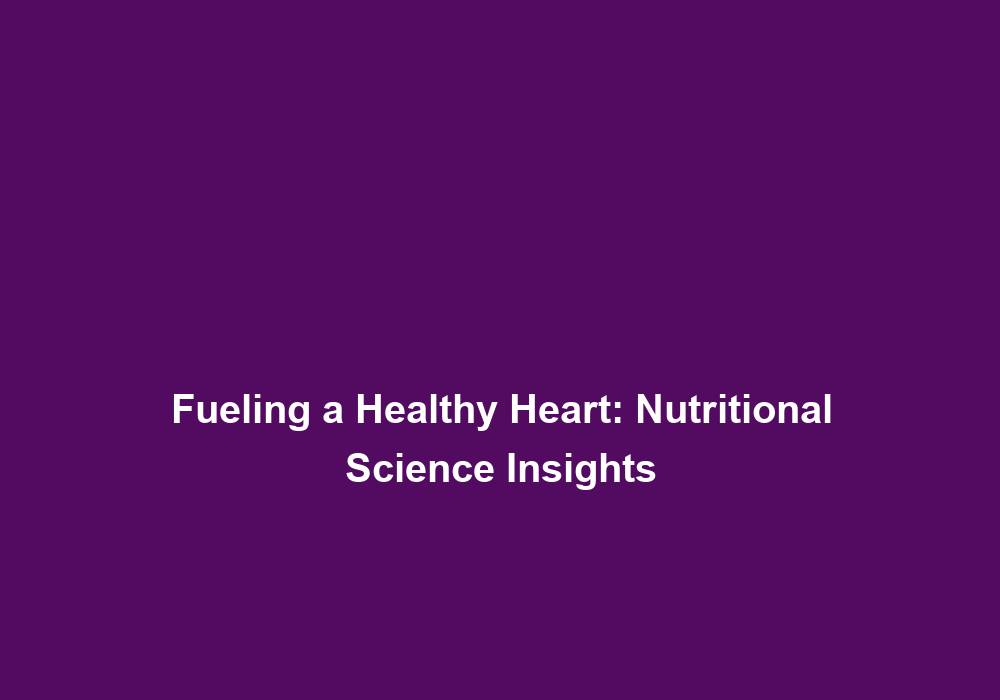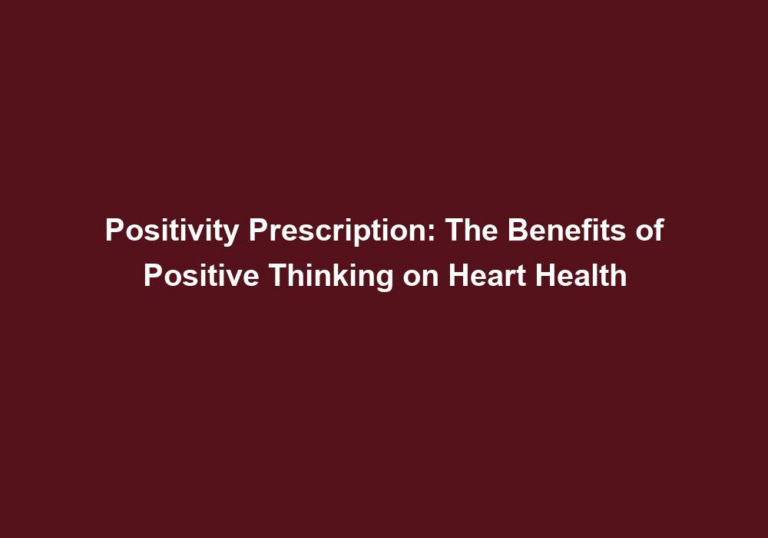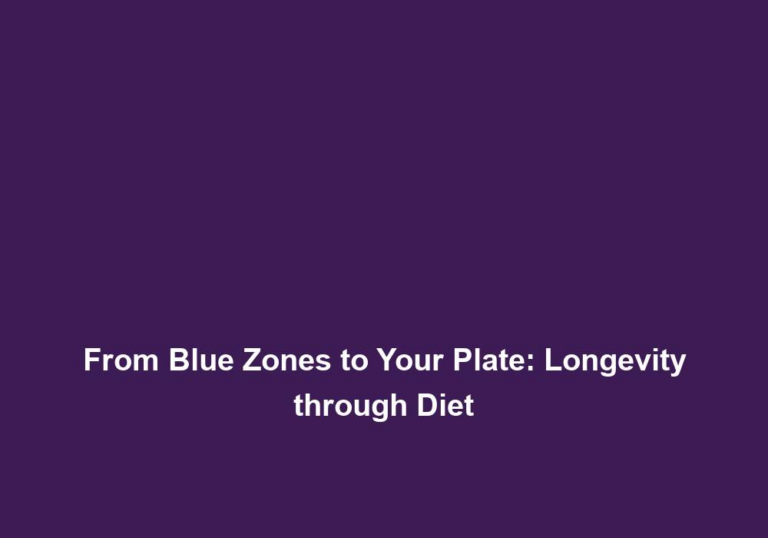Fueling a Healthy Heart: Nutritional Science Insights
The health of our hearts plays a crucial role in our overall well-being. A heart-healthy diet is one of the key factors that can significantly impact our cardiovascular health. In this article, we will explore the insights provided by nutritional science to understand how we can fuel our hearts with the right nutrients and make informed dietary choices.
The Importance of a Heart-Healthy Diet
Before we delve into the specifics, let’s understand why a heart-healthy diet is essential. Heart disease remains a leading cause of mortality worldwide, and several risk factors contribute to its development. These risk factors include high blood pressure, high cholesterol levels, obesity, diabetes, and smoking. While some of these factors are influenced by genetics and lifestyle choices, dietary habits play a significant role in their management and prevention.
A heart-healthy diet can help manage and prevent these risk factors. It focuses on consuming nutrient-dense foods that provide essential vitamins, minerals, and antioxidants necessary for optimal heart health. By fueling our bodies with the right nutrients, we can lower our risk of developing heart disease and improve our overall cardiovascular well-being.
Key Nutrients for a Healthy Heart
1. Omega-3 Fatty Acids
Omega-3 fatty acids, particularly eicosapentaenoic acid (EPA) and docosahexaenoic acid (DHA), are beneficial for heart health. These essential fatty acids help reduce inflammation, lower triglyceride levels, and prevent the formation of blood clots. Omega-3 fatty acids also support the overall functioning of the heart and blood vessels.
Including omega-3 fatty acids in our diet is crucial for a healthy heart. Fatty fish, such as salmon, mackerel, and sardines, are excellent sources of these beneficial fats. Plant-based options include flaxseeds, chia seeds, and walnuts. Incorporating these foods into our meals can provide us with the necessary omega-3 fatty acids to support heart health.
2. Fiber
A heart-healthy diet should also include an adequate amount of dietary fiber. Fiber offers numerous benefits for heart health. Soluble fiber, in particular, helps lower cholesterol levels by binding to bile acids, which are then excreted from the body. This process prompts the liver to use cholesterol from the bloodstream to produce more bile acids, leading to a reduction in overall cholesterol levels.
Fruits, vegetables, whole grains, legumes, and nuts are excellent sources of dietary fiber. Including these foods in our diet can help maintain healthy cholesterol levels, regulate blood sugar levels, and promote a healthy weight, all of which contribute to a healthy heart.
3. Antioxidants
Antioxidants are compounds that protect our cells from damage caused by free radicals. Free radicals contribute to the development of conditions like atherosclerosis, where plaque builds up in the arteries, restricting blood flow to the heart. Consuming a diet rich in antioxidants helps neutralize these harmful free radicals and reduce the risk of cardiovascular diseases.
Colorful fruits and vegetables, such as berries, leafy greens, and bell peppers, are excellent sources of antioxidants. Including a variety of these antioxidant-rich foods in our diet can provide us with the necessary protection against heart disease and promote overall heart health.
4. Magnesium
Magnesium is a mineral that plays a vital role in maintaining heart health. It helps regulate blood pressure, supports muscle function, and aids in the production of energy. Consuming an adequate amount of magnesium is essential for maintaining a healthy heart.
Green leafy vegetables, whole grains, nuts, and seeds are good dietary sources of magnesium. Including these foods in our diet can help ensure we meet our daily magnesium requirements and support optimal heart health.
5. Potassium
Potassium is another essential nutrient for heart health as it helps maintain normal blood pressure levels. It counteracts the effects of sodium, which can raise blood pressure and increase the risk of heart disease. Consuming an adequate amount of potassium is crucial for a healthy heart.
Bananas, oranges, avocados, spinach, and sweet potatoes are excellent sources of potassium. Including these potassium-rich foods in our diet can help regulate blood pressure and reduce the risk of heart disease.
Heart-Healthy Dietary Guidelines
Now that we have explored the key nutrients for a healthy heart, let’s discuss some general guidelines to help you make heart-smart food choices:
-
Choose Healthy Fats: Opt for unsaturated fats found in olive oil, avocados, and nuts, while limiting saturated and trans fats commonly found in processed foods and fatty meats. Incorporate these healthy fats into your meals to support heart health.
-
Include Lean Protein: Select lean sources of protein such as skinless poultry, fish, legumes, and nuts. These protein sources are low in unhealthy fats and provide essential nutrients for heart health. Limit red meat and processed meats, as they are often high in unhealthy fats.
-
Prioritize Whole Grains: Incorporate whole grains like brown rice, quinoa, whole wheat bread, and oats into your diet. These whole grains provide more fiber and nutrients compared to refined grains, supporting heart health.
-
Increase Fruit and Vegetable Intake: Aim for a variety of colorful fruits and vegetables to benefit from their heart-healthy antioxidants, fiber, and other essential nutrients. Include these nutrient-dense foods in your meals to support optimal heart health.
-
Limit Sodium Intake: Too much sodium can raise blood pressure. Reduce your intake by avoiding highly processed foods, using herbs and spices for flavoring instead of salt, and reading food labels for sodium content. By managing your sodium intake, you can support a healthy heart.
-
Control Portion Sizes: Be mindful of portion sizes to maintain a healthy weight. Overeating can lead to weight gain, increasing the risk of heart disease. Pay attention to serving sizes and listen to your body’s hunger and fullness cues.
-
Stay Hydrated: Drink plenty of water and limit sugary beverages and excessive alcohol consumption. Staying hydrated is essential for overall health, including heart health.
Remember, consistency is key when it comes to maintaining a heart-healthy diet. Make gradual changes to your eating habits and focus on long-term sustainability. By incorporating these heart-healthy dietary guidelines into your daily routine, you can nourish your heart with the nutrients it needs to thrive.
In conclusion, nutritional science offers valuable insights into fueling a healthy heart. By incorporating omega-3 fatty acids, fiber, antioxidants, magnesium, and potassium into our diets, we can improve our cardiovascular health. Additionally, following heart-healthy dietary guidelines, such as choosing healthy fats, lean protein, whole grains, fruits, and vegetables, while limiting sodium and controlling portion sizes, can significantly contribute to a healthy heart. Let’s prioritize our cardiovascular health by making informed dietary choices and nurturing our hearts with the nutrients they need.







